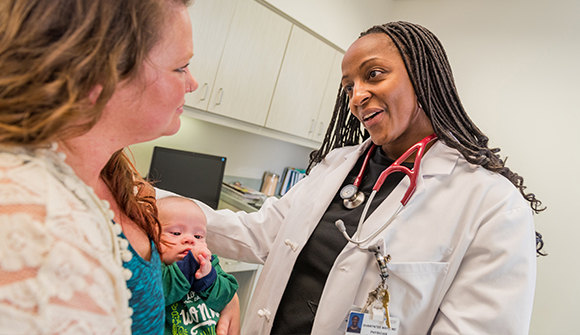Heart to Heart

Shawyntee Mayo, MD, MPH, medical director of the Pediatric Preventive Cardiology Clinic at Wolfson
According to the American Heart Association, about 40,000 children are born with a heart defect each year. A congenital heart defect (also called congenital heart disease) occurs when the heart or blood vessels surrounding it don’t develop properly before birth.
Shawyntee Mayo, MD, MPH, medical director of the Pediatric Preventive Cardiology Clinic at Wolfson Children’s Hospital and the UF Health Pediatric Cardiovascular Center, offers parents information about the signs and symptoms of congenital heart defects.
Can you prevent congenital heart disease (CHD)?
You can’t prevent it, but you can help reduce your child’s risk to develop congenital heart disease when you’re pregnant by:
- Avoiding any harmful medications, such as those used to treat acne or bipolar disorder
- Keeping your blood sugar levels under control if you are diabetic
- Taking your prenatal vitamins
- Ensuring your immunizations are up-to-date
When do parents typically find out if their child has a congenital heart defect?
It depends on what type of defect it is. Some can be detected as early as 18 to 22 weeks when an expectant mother goes in for her first anatomy sonogram. In this case, the OB/GYN will refer the mother to a perinatologist (high-risk OB/GYN) as well as a pediatric cardiologist specializing in fetal medicine who can help the family plan for the types of cardiovascular care their child will need.
Some symptoms of a congenital heart defect will be obvious, allowing the pediatric cardiologist to catch it earlier.
In other cases, a defect such as a smaller hole in the heart might not be detected until the child is a teenager.
How is it possible to diagnose heart defects before a baby is born?
Routine ultrasounds and prenatal tests help to reveal it, and then fetal echocardiography is used to confirm the diagnosis and pinpoint the exact condition.
Which treatment options are available for congenital heart defects?
Treatment options vary depending on the severity of the defect. Children may require only close monitoring or treatment with medicine. Some conditions may require minimally invasive cardiac catheterization, or more serious treatment, such as heart surgery.
To learn more about congenital heart defects and the pediatric heart services that are available for children and adults with CHD, visit wolfsonchildrens.com/LittleHearts.
Story Credit: https://www.baptistjax.com/juice/Stories/child-health/heart-to-heart
Click here to SUBSCRIBE to SafeBeat's newsletter.


